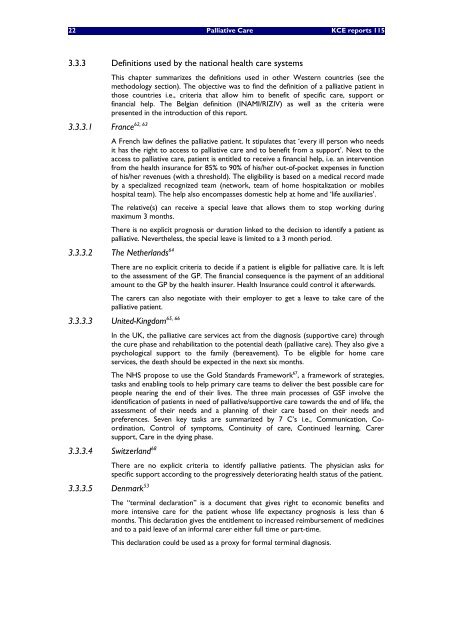Organisation des soins palliatifs en Belgique - KCE
Organisation des soins palliatifs en Belgique - KCE
Organisation des soins palliatifs en Belgique - KCE
Create successful ePaper yourself
Turn your PDF publications into a flip-book with our unique Google optimized e-Paper software.
22 Palliative Care <strong>KCE</strong> reports 115<br />
3.3.3 Definitions used by the national health care systems<br />
This chapter summarizes the definitions used in other Western countries (see the<br />
methodology section). The objective was to find the definition of a palliative pati<strong>en</strong>t in<br />
those countries i.e., criteria that allow him to b<strong>en</strong>efit of specific care, support or<br />
financial help. The Belgian definition (INAMI/RIZIV) as well as the criteria were<br />
pres<strong>en</strong>ted in the introduction of this report.<br />
62, 63<br />
3.3.3.1 France<br />
A Fr<strong>en</strong>ch law defines the palliative pati<strong>en</strong>t. It stipulates that ‘every ill person who needs<br />
it has the right to access to palliative care and to b<strong>en</strong>efit from a support’. Next to the<br />
access to palliative care, pati<strong>en</strong>t is <strong>en</strong>titled to receive a financial help, i.e. an interv<strong>en</strong>tion<br />
from the health insurance for 85% to 90% of his/her out-of-pocket exp<strong>en</strong>ses in function<br />
of his/her rev<strong>en</strong>ues (with a threshold). The eligibility is based on a medical record made<br />
by a specialized recognized team (network, team of home hospitalization or mobiles<br />
hospital team). The help also <strong>en</strong>compasses domestic help at home and ‘life auxiliaries’.<br />
The relative(s) can receive a special leave that allows them to stop working during<br />
maximum 3 months.<br />
There is no explicit prognosis or duration linked to the decision to id<strong>en</strong>tify a pati<strong>en</strong>t as<br />
palliative. Nevertheless, the special leave is limited to a 3 month period.<br />
3.3.3.2 The Netherlands 64<br />
There are no explicit criteria to decide if a pati<strong>en</strong>t is eligible for palliative care. It is left<br />
to the assessm<strong>en</strong>t of the GP. The financial consequ<strong>en</strong>ce is the paym<strong>en</strong>t of an additional<br />
amount to the GP by the health insurer. Health Insurance could control it afterwards.<br />
The carers can also negotiate with their employer to get a leave to take care of the<br />
palliative pati<strong>en</strong>t.<br />
65, 66<br />
3.3.3.3 United-Kingdom<br />
In the UK, the palliative care services act from the diagnosis (supportive care) through<br />
the cure phase and rehabilitation to the pot<strong>en</strong>tial death (palliative care). They also give a<br />
psychological support to the family (bereavem<strong>en</strong>t). To be eligible for home care<br />
services, the death should be expected in the next six months.<br />
The NHS propose to use the Gold Standards Framework 67 , a framework of strategies,<br />
tasks and <strong>en</strong>abling tools to help primary care teams to deliver the best possible care for<br />
people nearing the <strong>en</strong>d of their lives. The three main processes of GSF involve the<br />
id<strong>en</strong>tification of pati<strong>en</strong>ts in need of palliative/supportive care towards the <strong>en</strong>d of life, the<br />
assessm<strong>en</strong>t of their needs and a planning of their care based on their needs and<br />
prefer<strong>en</strong>ces. Sev<strong>en</strong> key tasks are summarized by 7 C’s i.e., Communication, Coordination,<br />
Control of symptoms, Continuity of care, Continued learning, Carer<br />
support, Care in the dying phase.<br />
3.3.3.4 Switzerland 68<br />
3.3.3.5 D<strong>en</strong>mark 53<br />
There are no explicit criteria to id<strong>en</strong>tify palliative pati<strong>en</strong>ts. The physician asks for<br />
specific support according to the progressively deteriorating health status of the pati<strong>en</strong>t.<br />
The “terminal declaration” is a docum<strong>en</strong>t that gives right to economic b<strong>en</strong>efits and<br />
more int<strong>en</strong>sive care for the pati<strong>en</strong>t whose life expectancy prognosis is less than 6<br />
months. This declaration gives the <strong>en</strong>titlem<strong>en</strong>t to increased reimbursem<strong>en</strong>t of medicines<br />
and to a paid leave of an informal carer either full time or part-time.<br />
This declaration could be used as a proxy for formal terminal diagnosis.

















